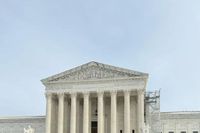Chief Justice John Roberts has temporarily halted a midnight deadline for the Trump administration to return Kilmar Abrego Garcia, a Maryland man who was mistakenly deported to a notorious prison in El Salvador. This decision, made on April 7, 2025, came just hours after the Justice Department filed an emergency appeal to the Supreme Court, arguing that U.S. District Judge Paula Xinis had overstepped her authority by ordering Garcia's return.
The administration has conceded that Garcia should not have been sent to El Salvador, as an immigration judge had previously determined that he likely faced persecution from local gangs. However, the government contends that Garcia is no longer in U.S. custody and lacks the means to facilitate his return. Solicitor General D. John Sauer described Xinis's order as part of a "deluge of unlawful injunctions" that judges have issued to impede President Trump’s immigration policies.
The Justice Department's appeal was directed to Roberts, who oversees appeals from Maryland. In a separate matter, the Trump administration is seeking Supreme Court approval to resume deportations of Venezuelan migrants accused of gang affiliations to the same Salvadoran prison under an 18th-century wartime law. A federal appeals court in Richmond, Virginia, denied the administration's request for a stay.
Judge J. Harvie Wilkinson, in a unanimous opinion, stated that there was no question that the government had erred in Garcia's case. "The government screwed up here," he wrote. The White House has labeled Garcia's deportation an "administrative error," while also alleging that he is a member of the MS-13 gang. Garcia’s attorneys vehemently dispute this claim, asserting that there is no evidence tying him to the notorious gang.
In her ruling, Judge Xinis criticized the government's actions, asserting that the decision to arrest and deport Garcia was "wholly lawless." She noted that the evidence against him consisted of vague and uncorroborated allegations, primarily based on his attire, which included a Chicago Bulls hat and hoodie. Garcia, a 29-year-old Salvadoran national, had been living in the U.S. since 2011 and held a work permit from the Department of Homeland Security (DHS). His wife is a U.S. citizen.
Garcia was detained by immigration agents on March 12, 2025, and deported just three days later, despite having a protective order against his removal issued by an immigration judge in 2019. This order barred his deportation to El Salvador due to fears of persecution. Following his deportation, his family filed a lawsuit demanding his return.
In a statement released through the immigration advocacy group CASA, Garcia’s wife, Jennifer Vasquez Sura, expressed hope and determination. "My children, family, and I will continue praying and seeking justice. Now that the court has spoken, I ask again that both President Trump and President Bukele stop attempting any further delays. They need to follow the court’s order NOW. My children are waiting to be reunited with their father tonight," she said.
On April 5, the Justice Department had requested the 4th Circuit Court of Appeals to stay Xinis's order, but this request was denied. The Trump administration argued that the midnight deadline set by the judge was "arbitrary" and "impossible," claiming that sensitive foreign negotiations should not be subjected to a judicially mandated timeline.
In his appeal to the Supreme Court, Sauer argued that Xinis's order was unprecedented and that the government lacked jurisdiction over the Government of El Salvador, thus asserting that it had no authority to return Garcia. He characterized the judge’s ruling as an overreach, stating that the district court had no power to control foreign relations or dictate the actions of the executive branch.
Garcia’s attorney, Simon Sandoval-Moshenberg, criticized the administration's appeal as "ridiculous," emphasizing that it was a clear mistake that needed rectification. "This is one guy. They made a mistake. They need to set it right," he stated. Sandoval-Moshenberg also expressed readiness to request the court to enforce its ruling if Garcia was not returned by the deadline.
In a related ruling, the 4th Circuit Court of Appeals unanimously stated that the government had no legal authority to remove a person lawfully present in the U.S. without due process. This sentiment was echoed by Judge Xinis, who highlighted that Garcia had been detained without justification and forcibly sent to a facility notorious for its harsh conditions.
In the midst of this legal battle, the Trump administration's stance remains that Garcia is a member of MS-13, a claim that has not been substantiated. The administration's argument hinges on the assertion that the deportation was an administrative error, yet it simultaneously seeks to maintain its authority over immigration enforcement.
As the Supreme Court takes up the case, it has ordered Garcia’s legal team to respond by 5 p.m. on April 8, 2025. The outcome of this case could have significant implications for immigration policy and the rights of individuals facing deportation under dubious circumstances.
Garcia's story is emblematic of the broader debates surrounding immigration enforcement in the U.S., particularly under the Trump administration, which has prioritized strict immigration controls. His case raises critical questions about due process and the legal rights of individuals who find themselves entangled in the immigration system.
As the situation develops, many are watching closely, hoping for a resolution that will reunite Garcia with his family and uphold the principles of justice and fairness that underpin the American legal system.









